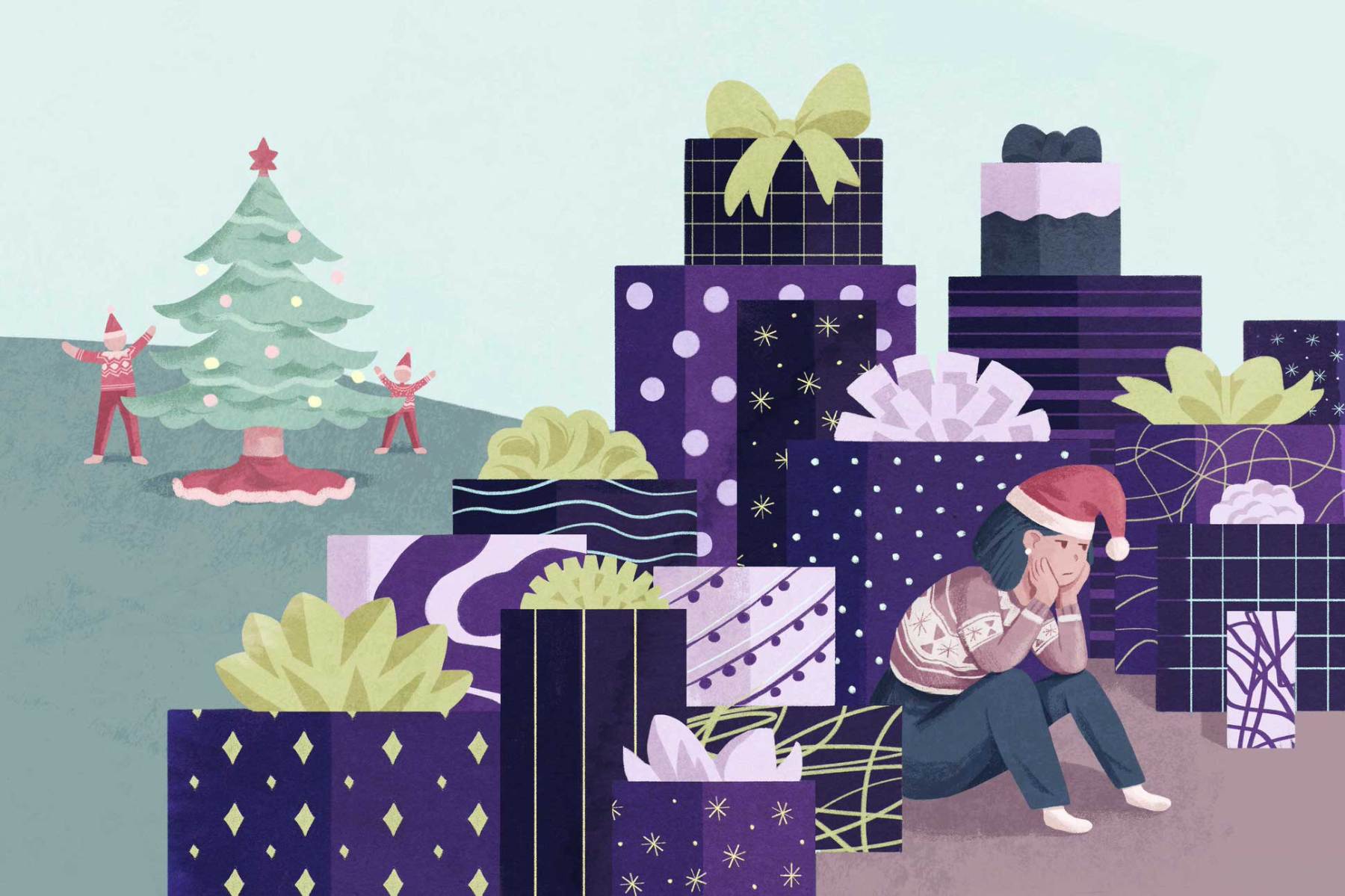It was the morning after Thanksgiving when her body finally gave out. The layers upon crushing layers of loss — her grandmother two days prior, her job at the start of the year — tethered her to her bed. As did all the little losses, the in-between bits this year where structure dissolved, order vanished and sanity waned.
Amy Kugler had reached the point where the answer to her husband’s question — are you OK? — came out as a resounding “no.”
But Christmas was only 28 days away, and even as she said it, her mind wandered to the tree they were supposed to be picking out with their 3-year-old son and the Christmas lights. My God, she thought, she couldn’t put up the lights.
In her head it was a ping-pong between obligation and exhaustion.
Can I do this? Can I rest? Can I do this? Can I not?
Kugler had to mourn the grandmother’s death, which was not caused by COVID-19, but was still affected by it, through a funeral broadcast on a Facebook Live video. Would she mourn Christmas, too? She wondered whether for the first time, she wouldn’t be able to complete all of the tasks — the work — that needs to happen to conjure up Christmas magic. It’s work that too often falls on moms to perform, the same moms who have already endured an unmooring year that has displaced them from work, tested the reaches of their patience, and still asked them to give more and more and more.
Kugler could already see how Christmas day could play out: She would be the one fielding texts all day about when to Zoom the grandparents and when to FaceTime. She’d be the one cooking dinner, an extra special version that said, “we survived a pandemic this year.” And she would have to make time to play with her son so he has a memory to tuck away about his pandemic Christmas.
“It’s going to be the most stressful holiday, in my opinion,” said Kugler, speaking on Zoom from a Starbucks parking lot in Seattle — the only place she could go to get some quiet.
“I’m not a bare minimum person,” said Kugler, 39. “And that’s where the rub is. I feel more guilt put on myself for not being able to be that person.”
Pressure and guilt, in all their forms, converge around this time every year, when the invisible work women typically do at home gets ratcheted up a few notches for the holidays. Add to that the pandemic, which has claimed more than 300,000 U.S. lives and, at its worst point, 20.8 million jobs. People are burnt out. Women most of all.
And yet, the household work — who keeps track of what groceries to buy, what appointments to make, the outfits needed for the holiday photos — continues to fall on women, as it historically has. In the paid labor force, women continue to make up the majority of caregiving positions. (They’re 95 percent of the child care workforce and 75 percent of the health care workforce.) In the unpaid labor force, gender norms ensure much of that same work was delegated to women in the household, said feminist sociologist Lisa Huebner, a professor of women’s and gender studies at West Chester University of Pennsylvania.
“We’re gendering anything related to care, so the holidays become like, ‘This is how you show your love,’” Huebner said. “We don’t talk about those things in terms of workplace skills, like strategies and being creative and being intelligent. Instead we still frame those as being caring and focusing on family, and then we further attach that in gendered ways.”
Women are still socialized to be the organizers, cleaners and emotional managers — ideas that are further reinforced in the media, advertising, even at school.
“It’s not that men can’t or even don’t want to,” Huebner said. “It’s that they’re not practiced at it.”
All of that was already true before 2020, before the year that changed everything.
For Kugler, now it also feels like every task on the self-regenerating to-do list of the holidays will be mixed with grief and exhaustion.
For some, the pandemic has, somehow, impossibly, added even more pressure — the desire to give something positive to hold onto at the end of a year that has seemingly only taken away.
And for others, it has recalibrated the holidays, unraveling years of thinking less wasn’t enough.
Kristina Aleksander, for instance, is ready to cancel Christmas.
She had the talk with her husband, an attorney who promptly pulled out a yellow legal pad and started making a pros and cons list. It all boiled down to a simple flip: If he really wanted Christmas to happen this year, it would be his job to see it through instead of hers.
Reaching that decision feels like they’ve come miles from the time last year when her daughter was born and Aleksander plunged into postpartum depression. She’d hide away in her room at the end of a day working in communications at the Iowa State Capitol. Her husband once said her mood was affecting the entire house.
That labor, invisible and emotional, was hers alone to bear. Her husband helped with many tasks, but she was the center of the household for them, and that responsibility came with expectations about the work they relied on her to perform.
Not this year.
“There is a lot of forced expectation around Christmas and New Year’s where you just have to enjoy yourself and have fun. At least for my age group, women who are in their 20s to late 20s, it feels like a performance that we are putting up for Instagram,” said Aleksander, 26. “And I am just out of energy this year.
I don’t want to perform for anyone.”
The performative aspect is especially visible on social media, where people are spending so much more time as they stay socially distanced and quarantined.
“We have this very intensive Pinterest culture that backs up against these ridiculous expectations for homemaking,” said Eve Rodsky, who has spent a decade talking and writing about invisible labor. “Women were conditioned to have it all and do it all. And then doing it all is a lot higher level threshold because doing it is inspired by Pinterest and Instagram and a lot of counting and competing.”
But doing it all, especially at the end of the year, requires time — and at the source of the problem is the way we look at how men and women spend it.
“We’ve been guarding men’s time since the beginning of time,” Rodsky said. “Women’s time is infinite.”
Rodsky’s book, “Fair Play: A Game-Changing Solution for When You Have Too Much to Do (and More Life to Live),” draws on her work talking to couples, most of them heterosexual, about the way they approach invisible labor and outlines a road map for addressing it. She usually guides couples through two key points.
First, there has to be buy-in. Most men Rodsky works with tell her the tasks their wives obsess over are unnecessary, and they don’t understand why they’re nagging them to do it or why it’s taking place at all. But, Rodsky said, part of it is men often don’t understand the unseen work: the cognitive load of keeping track of something, organizing it and executing it.
As an example, she told the story of Ed and Julie, a couple at a crossroads over a second grade DIY secret Santa project. Julie had to explain to Ed why it mattered: The girl their son got as his secret Santa had few friends — Julie, as the designated drop-off parent for school, knew this — and their son delivering on the gift would mean a lot. Once Ed understood the stakes, he could get to the second part of the equation: ownership of the task.
Watching Ed go to Michael’s, the craft store, and make popsicle-stick jewelry holder with glitter-covered hands changed their relationship that year. Julie felt Ed was really in it with her.
It started with creating room for a conversation most women don’t know how to start. It’s completely different in many of the same-sex couples Rodsky works with, she said, because many already have the context for starting difficult conversations — about coming out, or introducing partners or making health decisions for their children. “What a lot of same-sex couples will say to me is that the reticence of hetero couples to have these types of conversations because roles are already assigned feels sad to them,” Rodsky said.
I am just out of energy this year. I don’t want to perform for anyone.
Kristina Aleksander
This year, it feels like the pandemic has been the catalyst for some of the conversations to take place, she said. With so many people working from home, the labor that happened in the background is now happening at the fore, with everyone around to see it. And so more and more people are choosing to unburden themselves for the holidays, opting for a slimmed down approach to the festivities.
Laura Mayes, a spokeswoman for the City of San Antonio who has been working on the city’s COVID-19 response, is exhausted after a year that eliminated the concept of a break. That’s why she’s planning a smaller Christmas at home, far from her family and without the opportunity to really start creating memories for her 3-year-old, who won’t sit on Santa’s lap or see her grandparents this year.
But even with abridged plans and being tired from a long, stressful year, Mayes admits there’s a part of her that likes the control of doing most of the holiday work herself.
“When I let go of control, then I get all anxious and I want to know what’s going on,” said Mayes, 33. “Where I’ll accept the extra work, I also know at the end I would have wanted it done in certain ways, too.”
That’s another tension point, one some women whisper almost shamefully. By admitting they like the organization or prefer to do it all themselves, that could absolve their partners of needing to help.
It’s even more complicated for stay-at-home moms. Carly Gibbs stopped practicing law to spend more time with her three kids — a first grader, a preschooler and a three-month-old baby — while her husband kept his job as a doctor in Salt Lake City.
If she’s not going to be an attorney, she tells herself, she has to be an excellent mom.
“I am very bad at feeling OK with not doing everything,” said Gibbs, 37. “My inclination is I need to do everything and if I don’t, usually the consequence I am most fearful of or anticipate is my kids being disappointed in any way.”
It takes some mental fortitude for her to reason out of that sometimes. They won’t really care if they don’t build the gingerbread house this year — right?
The pressure women put on themselves is common, said Celeste Headlee, a journalist and author of two books on communication and overworking. So is the desire to want to take up the task themselves because they’ll do it faster, better — in a more organized fashion with less fuss.
Headlee suggests making a list that makes easily visible all the invisible tasks and then dividing it by strengths. Each person puts their initials next to their task for accountability, and the list goes in a public place.
“We are dealing with centuries of pressure that come from religious forces, political forces and corporate forces that led us to believe we have to be working all the time, and we will never meet the bar,” Headlee said. “Instead, I would approach this like you would a project at work — who is going to do what?
Liza Dube and her two sons are going to celebrate their Christmas on their own timeline, a liberation from the years of big parties and coordinated family Christmas caroling.
“What’s driving all of that is really that emotional labor and that tradition-keeping and magic-making, memory-creating and relationship-maintaining,” said Dube, 42. “So this year I feel like we’ve really been trying to kind of get a little bit closer to what the intent is behind a lot of those things, and figuring out simpler ways to meet that intent.”
She plans to celebrate with the boys on a day of their choosing, and they’ll spend Christmas Day with their dad, where they can bake the cookies and do the traditions without having to be shuttled from house to house in their small Massachusetts town. Dube, meanwhile, plans to spend Christmas Day doing something she’s always wanted to do: volunteer, this year with a crisis hotline.
She wonders if she’ll ever do it the old way again.
“I’ve been saying a lot this year, ‘Everybody has to make choices,’” Dube said. “We are all just making choices and we can’t even compare them with each other’s choices anymore.”




